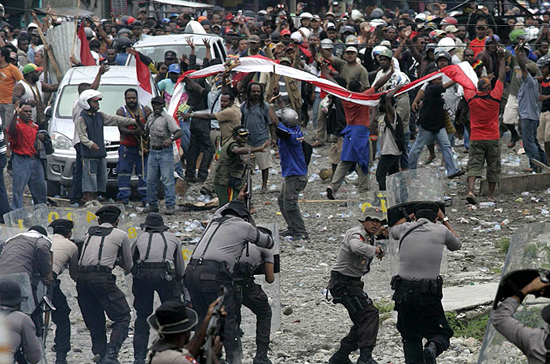
Karen Abplanalp
AUCKLAND (Pacific Scoop / Pacific Media Watch): New Zealand’s public pension Superfund stand against alleged Indonesian government security forces breaches of human rights is making a mark around the world.
The story has been covered by international media and hit the front page of Indonesian news website the Jakarta Globe today, with the headline New Zealand fund pulls Freeport investment, cites Papua rights offences.
It is the first time a government fund has made statements linking Indonesian security forces, corruption and human rights abuses.
The NZ Superfund (NZSF) and its investment in the US-owned mining giant Freeport McMoRan’s Grasberg mine were the subject of a major Metro investigation last December written by me while I was a postgraduate communication studies student at AUT University.
At the time, the fund was adamant that it would not divest from Freeport and that the mining company was meeting the fund’s responsible investment standards.
What has changed then for NZSF since the Metro investigation?
NZSF’s head of responsible investing Anne-Maree O’Connor replied to Pacific Scoop: “We have had more time to continue our engagement with a number of companies on our portfolio and to review the resources we have to commit to engagement, and look through which companies we would likely have success with engagement, which ones we needed to draw a line with that we should not pursue engagement because we did not feel that would could generate enough change given our resources and our holdings in the company.
Human rights breached
The NZSF statement said: “Freeport-McMoRan has been excluded based on breaches of human rights standards by security forces around the Grasberg mine, and concerns over requirements for direct payments to government security forces by the company in at least two countries in which it operates.
“Despite improvements in Freeport-McMoRan’s own human rights policies, breaches of standards by government security forces are beyond the company’s control. This limits the effectiveness of further engagement with the company.”
NZSF has investments with RioTinto, which owns 40 percent of Freeport McMoRan – does this mean that NZSF will divest from Rio Tinto also?
O’Connor said: “Freeport McMoRan is the operator mine and they are the ones who make the payments to (the military) and are responsible on the security issues.”
“… It is a significant stake, 40 percent, but Freeport McMoRan is the company that is operating the mine, and they are the ones that need to make management policy decisions.”
It will be interesting to see if other crown financial institutes follow suit.
The Government Pension Fund and the Earthquake Commission also have investments in Freeport McMoRan.
IHRC thanks fund
The Auckland-based Indonesia Human Rights Committee (IHRC), which has long campaigned against “unethical” investment in the mine, met with the NZSF today to thank the fund for its decision to divest from Freeport McMoRan.
IHRC chair Maire Leadbeater said the meeting went “extremely well”.
“We were met by CEO Adrian Orr and by Anne-Maree O’Connor and were shown to a room of about 40 people, all of their staff.”
Leadbeater told the staff they were really pleased about the decision, and told them about the kind of response they were getting from around the world.
Indonesia and Timor-Leste campaigner Josef Benedict from Amnesty International said the agency continued to receive “credible reports” of human rights violations committed by the security forces in the neigbouring provinces of Papua and West Papua.
The reports included allegations of torture and other ill-treatment, unnecessary and excessive use of force and firearms and possible unlawful killings.
“Investigations into reports of police abuses are rare and only a few perpetrators have been brought to justice,” he said.
“Amnesty International is also concerned that international observers, non-governmental organisations and journalists continue to be to be denied unrestricted access to the two provinces.”
Amnesty International believes that the lack of independent and impartial monitoring of human rights in the West Papua region contributes to a “climate of impunity”.
PMW article on the Super Fund issue
This work is licensed under a Creative Commons Attribution-NonCommercial 3.0 New Zealand Licence.




